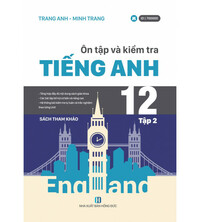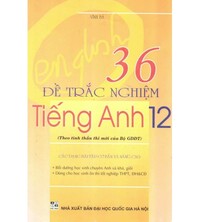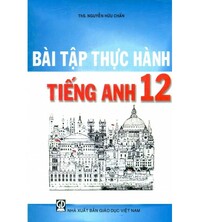Đề kiểm tra cuối kì 1 môn tiếng Anh lớp 12 có đáp án
Với Đề thi học kỳ 1 môn tiếng Anh lớp 12 trường THPT Hàm Long, Bắc Ninh năm học 2016 - 2017 có đáp án bạn sẽ không còn phải lo lắng về tài liệu ôn thi cũng như định hướng ôn tập nữa. Tìm Đáp Án luôn đồng hành cùng bạn trong các kỳ thi cũng như giúp bạn có tài liệu chất lượng ôn tập chuẩn bị cho các kỳ thi học kỳ 1 quan trọng sắp đến.
Đề thi học kỳ 1 môn Tiếng Anh lớp 12 Thí Điểm năm học 2016 - 2017 có đáp án
Đề thi học kỳ 1 môn tiếng Anh lớp 12 trường THPT Đa Phúc, Hà Nội năm học 2016 - 2017 có đáp án
Đề thi học kỳ 1 môn tiếng Anh lớp 12 trường THPT Quế Võ 3, Bắc Ninh năm học 2016 - 2017 có đáp án
Mark the letter A, B, C, or D to indicate the word whose underlined part differs from the other three in pronunciation in each of the following questions.
Question 1: A. naked B. looked C. laughed D. developed
Question 2: A. attempts B. shares C. looks D. beliefs
Mark the letter A, B, C, or D to indicate the word that differs from the other three in the position of the primary stress in each of the following questions.
Question 3: A. typical B. favorite C. division D. organize
Question 4: A. certificate B. necessary C. economy D. geography
Mark the letter A, B, C, or D to indicate the word(s) CLOSEST in meaning to the underlined word(s).
Question 5: What may happen if John doesn't arrive on time?
A. go along B. count on C. keep away D. turn up
Question 6: Tennis wear has become a very lucrative business for both manufacturers and tennis stars.
A. illegal B. profitable C. circumstantial D. expensive
Mark the letter A, B, C, or D to indicate the word(s) OPPOSITE in meaning to the underlined word(s).
Question 7: No one knew precisely what would happen to human being in space.
A. casually B. flexiblely C. wrongly D. exactly
Question 8: All the students got high marks in the test but Mary stood out.
A. got very good marks B. got higher marks than someone
C. got the most marks of all D. got the fewest marks of all
Mark the letter A, B, C, or D to indicate the underlined part that needs correction in each of the following questions.
Question 9: The major goals of primary education is to achieve basic literacy and numeracy among all students.
A. The majot goal B. is C. to achieve D. and
Question 10: The colonist who first settled in New England did so because they felt there was none social justice in their homeland of England.
A. who B. did so C. because D. none
Question 11: Having been finished her household chores, Mary decided to do some shopping.
A. Having been finished B. chores C. to do D. shopping
Mark the letter A, B, C, or D to indicate the correct answer in each of the following questions.
Question 12: They______ enthusiastically when their teacher ______ in.
A. discuss/ comes B. will have discussed/ comes
C. will discuss/ came D. were discussing/ came
Question 13: It is parents' duty and responsibility to ______ hands to take care of their children and give them a happy home.
A. shake B. hold C. join D. take
Question 14: The world's biodiversity is declining at an unprecedented rate, which makes wildlife _______.
A. prosperous B. prefect C. vulnerable D. remained
Question 15: She is ______ I expected.
A. more prettier than B. far prettier than C. much more prettier than D. a lot prettier
Question 16: ______ fuel that is used today is a chemical form of solar system.
A. Most of B. The most C. Most D. Almost the
Question 17: Most foreign students don't like American coffee, and ______
A. I don't too B. neither did I C. either don't I D. neither do I
Question 18: Nobody died in the accident, but 20 people were ______.
A. damaged B. injured C. spoiled D. wounded
Question 19: If she ______sick, she would have gone out with me to the party.
A. hasn't been B. wasn't C. weren't D. hadn't been
Question 20: ______ he was lazy, he failed the exam.
A. So B. Consequently C. Thus D. Now that
Question 21: Who was the first person ______ the South Pole?
A. to reach B. who reaches C. reached D. reaching
Question 22: There were ______ few tickets sold that the concert was cancelled.
A. a B. very C. so D. such
Question 23: Don't worry. They will do the job as _____ as possible.
A. economically B. economical C. economic D. to be asked
Question 24: Peter: "How do you get to work?"
Mary: "__________________"
A. It is very far B. I walk, of course C. about 2 kilometres D. I was taken there
Question 25: John: "I don't think I can do this. "
George: " ___________________"
A. Oh, come on! Give it a try B. Yeah, it's not easy
C. No, I hope not D. Sure, no way!
Mark the letter A, B, C, or D on your answer sheet to indicate the sentence that is closest in meaning to each of the following questions.
Question 26: It is not until a Vietnamese girl getting18 years old that she is allowed to get married legally.
A. A Vietnamese girl is not allowed to get married legally only when she gets 18 years old.
B. A Vietnamese girl is allowed to get married legally only after she gets 18 years old.
C. They never allow a Vietnamese girl to get married legally when she is 18 years old.
D. The legal allowance for a Vietnamese girl to get married will be issued in 18 years.
Question 27: The thief wore gloves so as to avoid leaving any fingerprints.
A. The thief wore gloves so as to not leave any fingerprints.
B. The thief wore gloves so that not leave any fingerprints.
C. The thief wore gloves in order not to leave any fingerprints.
D. The thief wore gloves in order to not leave any fingerprints.
Question 28: He might have been joking when he said he was planning to leave home.
A. The idea of leaving home probably amused him a great deal.
B. I don't know if he was serious when he expressed his intention of leaving home.
C. He could have made a joke about the situation when he left home.
D. He said he was going to leave home, but it turned out to be only a joke.
Mark the letter A, B, C, or D on your answer sheet to indicate the sentence that best combines each pair of sentences in the following questions.
Question 29: My motorbike cannot start in the mornings. I think I will get the garage to repair it.
A. My motorbike cannot start in the mornings, so I will have it repaired.
B. My motorbike which I will have it repaired cannot start in the morning.
C. My motorbike which I will get it repaired cannot start in the mornings.
D. My motorbike I will get it repaired which cannot start in the mornings.
Question 30: Sue and Brian met. Shortly after that, he announced they were getting married.
A. As soon as Sue and Brian met, they announced they were getting married.
B. Right at the time Brian met Sue, he announced they were getting married.
C. Scarcely had Sue and Brian met when he announced they were getting married.
D. Until Sue and Brian met, they had announced they were getting married.
Read the following passage and mark the letter A, B, C, or D on your answer sheet to indicate the correct word or phrase that best fits each of the numbered blanks from 31 to 35.
The General Certificate of Secondary Education or the GCSE examinations for _____(31) are the standard school-leaver qualifications taken by_____(32) all UK students in the May and June following their 16th birthday. If you come to a UK _____ (33) school before you ______(34) the age of 16, you will study towards GCSE examinations in up to 12 subjects. Some subjects are _____(35), including English and mathermatics, and you can select others such as music, drama, geography and history from a series of options.
Question 31. A. short B. long C. big D. a while
Question 32. A. similarly B. fortunately C. approximately D. virtually
Question 33. A. dependence B. independence C. independent D. independently
Question 34. A. reach B. come C. approach D. go
Question 35. A. necessary B. compulsory C. optional D. required
Read the following passage and mark the letter A, B, C or D on your answer sheet to indicate the correct answer to each of the questions from 36 to 42
When most people hear the term "National Park", they automatically think of names such as "Yellowstone", or "Yosemite", or "Grand Canyon". The big parks' names bring to mind vast stretches of undisturbed wilderness perfect for hiking, camping, and nature-watching. But while this vision of America's National Parks is wholly accurate and sufficiently breathtaking, there's more.
America's National Park system has an incredible 388 places to visit. This number includes not only the big parks, but also monuments, historical sites, recreation areas, battlefields, as well as scenic lakeshores, and rivers. And the Parks themselves don't just stop at geyser-fields and mule-excursions. In America's National Parks, you can climb an active volcano in Hawaii, "spelunk" the vast underground world of Mammoth Cave in Kentucky, dive the exotic coral reef of Biscayne Bay in Florida, or cast your fishing nets in the far reaches of the Pacific with the locals of America Samoa. Each of these 388 places has a unique appeal – from the natural to the manmade, from the ethereal to the factual, from the subtle to the overwhelming –with the whole collection offering vacationers a nearly endless range of interests and activitists in which to explore and indulge.
SeeAmerica. org is a great place to begin planning your trip to one of, or several of, America's National Parks. From the home pages, you can search all of the Parks by name, region, activity, or even zip code. The site also serves as a portal to other important sites, like the Nartional Park Sevice's official website, www. nps. gove, and the National Park Foundation's www. nationalparks. org. From SeeAmerica. org, you can get to all the information you will need to plan your trip from start to finish- from directions to the park, to park free, to typical weather conditions.
Question 36: What is the most popular national parks in the USA?
A. Yellowstone B. Yosemite C. Grand Canyon D. all are correct
Question 37: What is not true about the US national parks?
A. They are undisturbed wilderness
B. In each natioal park, there are 388 places to visit
C. They are perfect for camping
D. Tourists to the parks can enjoy nature-watching
Question 38: What is NOT included in the national parks?
A. monuments B. seashores C. zoos D. big parks
Question 39: The word "breathtaking" mostly means_________?
A. extremely impressive B. not bad C. uninteresting D. not shocking
Question 40: Which of these can be enjoyed in a national park in Hawaii?
A. Climbing an active volcano B. Diving the exotic coral reef
C. Going fishing with the locals D. Going on mule-excursions
Question 41: The word "indulge" mostly means _______?
A. Wander off B. enjoy yourself C. live alone D. interfere with
Question 42: Which of the following statements is NOT true?
A. The names of parks just suggest part of the pleasure of visits to them
B. There are 388 places of interest in the US national park system
C. All you see at national parks are natural
D. There are great variety of things fo vacationers to enjoy
Read the following passage and mark the letter A, B, C or D on your answer sheet to indicate the correct answer to each of the questions from 43 to 50
In most discussions of cultural diversity, attention has focused on visible, explicit aspects of culture, such language, dress, food, religion, music, and social rituals. Although they are important, these visible expressions of culture, which are taught deliberately and learned consciously, are only the tip of the iceberg or culture. Much of culture is taught and learned implicitly, or outside awareness. Thus, neither cultural insiders nor cultural outsiders are aware that certain "invisible" aspects of their culture exist.
Invisible elements of culture are important to us. For example, how long we can be late before being impolite, what topics we should avoid in a conversation, how we show interest or attention through listening behavior, what we consider beautiful or ugly. These are all aspects of culture that we learn and use without being aware of it. When we meet other people whose invisible cultural assumptions differ from those we have learned implicitly, we usually do not recognize their behavior as cultural in origin.
Differences in invisible culture can cause problems in cross-cultural relations. Conflicts may arise when we are unable to recognize others' behavioral differences as cultural rather than personal. We tend to misinterpret other people's behavior, blame them, or judge their intentions or competence without realizing that we are experiencing cultural rather than individual differences.
Formal organizations and institutions, such as schools, hospitals, workplaces, governments, and the legal system are collection sites for invisible cultural differences. If the differences were more visible, we might have less misunderstanding. For example, if we met a man in a courthouse who was wearing exotic clothes, speaking a language other than ours, and carrying food that looked strange, we would not assume that we understood his thoughts and feelings or that he understood ours. Yet when such a man is dressed similarly to us, speaks our language, and does not differ from us in other obvious ways, we may fail to recognize the invisible cultural differences between us. As a result, mutual misunderstanding may arise.
Question 43: What is the main purpose of the passage?
A. To explain the importance of invisible aspects of culture
B. To describe cultural diversity.
C. To point out that much of culture is learned consciously.
D. To explain why cross-cultural conflict occurs.
Question 44: The word "deliberately" in bold in paragraph 1 is closest in meaning to ___.
A. slowly B. accurately C. intentionally D. randomly
Question 45: The phrase "the tip of the iceberg" in bold in paragraph 1 means that ____.
A. other cultures seem cold to us
B. visible aspects of culture are learned in institutions
C. we usually focus on the highest forms of culture
D. most aspects of culture cannot be seen
Question 46: It can be inferred paragraph 3 that conflict results when_______
A. people think cultural differences are personal
B. people compete with those from other cultures
C. One culture is more invisible than another culture
D. some people recognize more cultural differences than others
Question 47: According to the passage, which of the following is NOT true?
A. We are often aware that we are learning about culture
B. Visible aspects of cultures receive much attention in discussion of cultural diversity
C. People misinterpret other people's behavior because they know they are experiencing cultural differences
D. Invisible cultural differences are often witnessed at formal organizations and institutions
Question 48: The author implies that institutions such as school and workplaces _______.
A. are aware of cultural differences
B. teach their employees about cultural differences
C. reinforce invisible cultural differences
D. Share a common culture
Question 49: The "exotic" in bold in paragraph 4 is closest in meaning to _______.
A. colourful B. strange C. familiar D. beautiful
Question 50: Which of the following would most likely result in misunderstanding?
A. Learning culture about our own culture in school
B. Unusual food being cooked by foreign visitors
C. Strange behavior from someone speaking a foreign language
D. Strange behavior from someone speaking our language







